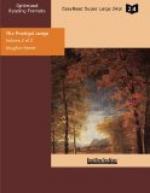No private citizen had shown greater zeal than Judge Slocum Price, no voice had clamored more eloquently for speedy justice than his. He had sustained a loss that was in a peculiar sense personal, he explained. Mr. Norton was his friend and client; they had much in common; their political ideals were in the strictest accord and he had entertained a most favorable opinion of the young man’s abilities; he had urged him to enter the national arena and carve out a career for himself; he had promised him his support. The judge so worked upon his own feelings that presently any mention of Norton’s name utterly unmanned him. Well, this was life. One could only claim time as it was doled out by clock ticks; we planned for the years and could not be certain of the moments.
He spent two entire days at the church and in the surrounding woods, nor did any one describe the murder with the vividness he achieved in his description of it. The minister’s narrative was pale and colorless by comparison, and those who came from a distance went away convinced that they had talked with an eyewitness to the tragedy and esteemed themselves fortunate. In short, he imposed himself on the situation with such brilliancy that in the end his account of the murder became the accepted version from which all other versions differed to their discredit.
In the same magnificent spirit of public service he would have assumed the direction of the search for the murderer, but Mr. Betts’ jealousy proved an obstacle to his ambitious design. In view of this he was regretful, but not surprised when the hard-ridden miles covered by dusty men and reeking horses yielded only failure.
“If I had shot that poor boy, I wouldn’t ask any surer guarantee of safety than to have that fool Betts with his microscopic brain working in unhampered asininity on the case,” he told Mahaffy.
“Is it your idea that you are enlarging your circle of intimate friends by the way you go about slamming into folks?” inquired Mahaffy, with harsh sarcasm.
Later, the judge was shocked at what he characterized as official apathy. It became a point on which he expressed himself with surpassing candor.
“Do they think the murderer’s going to come in and give himself up?—is that the notion?” he demanded heatedly of Mr. Saul.
“The sheriff owns himself beat, Sir; the murderer’s got safely away and left no clue to his identity.”
The judge waived this aside.
“Clues, sir? If you mean physical evidence the eye can apprehend, I grant it; the murderer has got away; certainly he’s been given all the time he needed, but what about the motive that prompted the crime? An intelligently conducted examination such as I am willing to undertake might still bring it to light. Isn’t it known that Norton was attacked a fortnight ago as he was leaving Belle Plain? He recovers and is about to be married to Miss Malroy when he is shot at the church door; I’ll hazard the opinion the attack was in the nature of a warning for him to keep away from Belle Plain. Now, had he a rival? Clear up these points and you get a clue!” The judge paused impressively.




